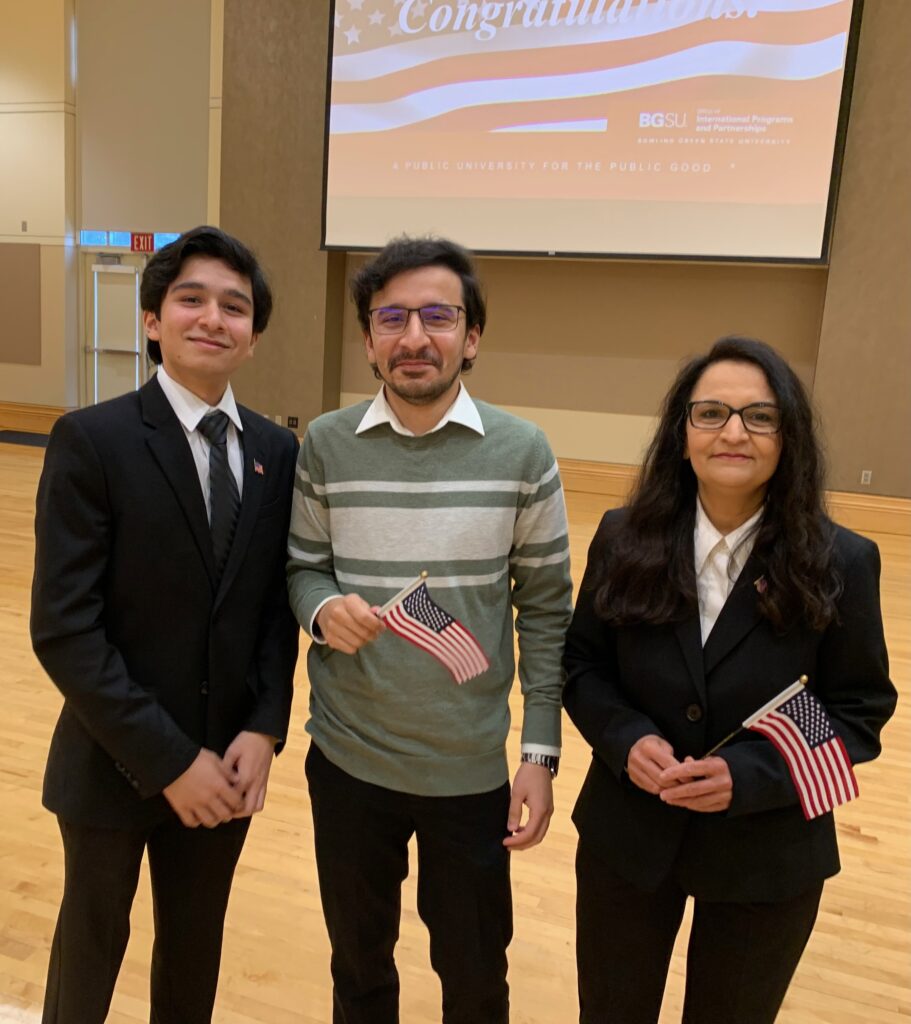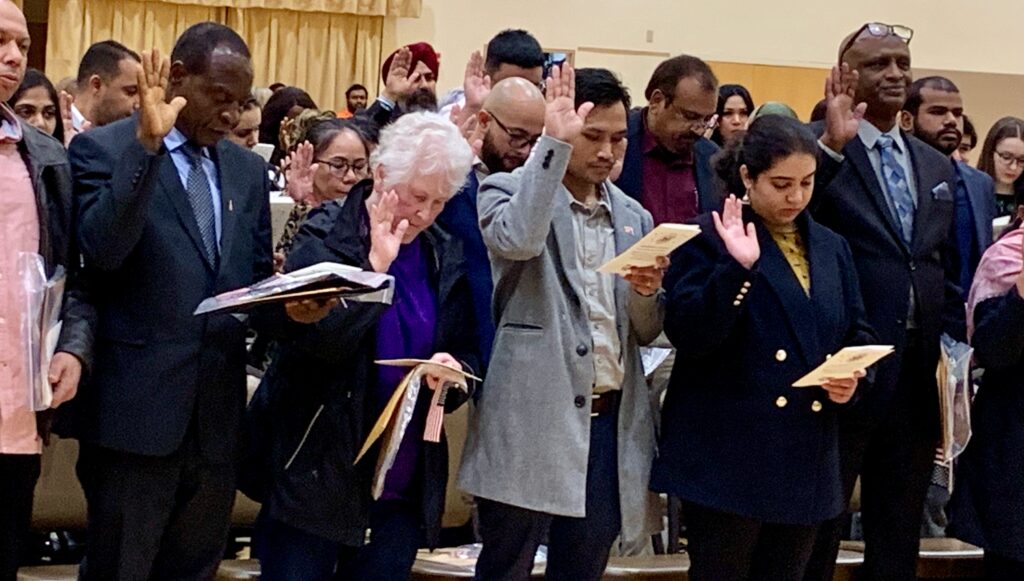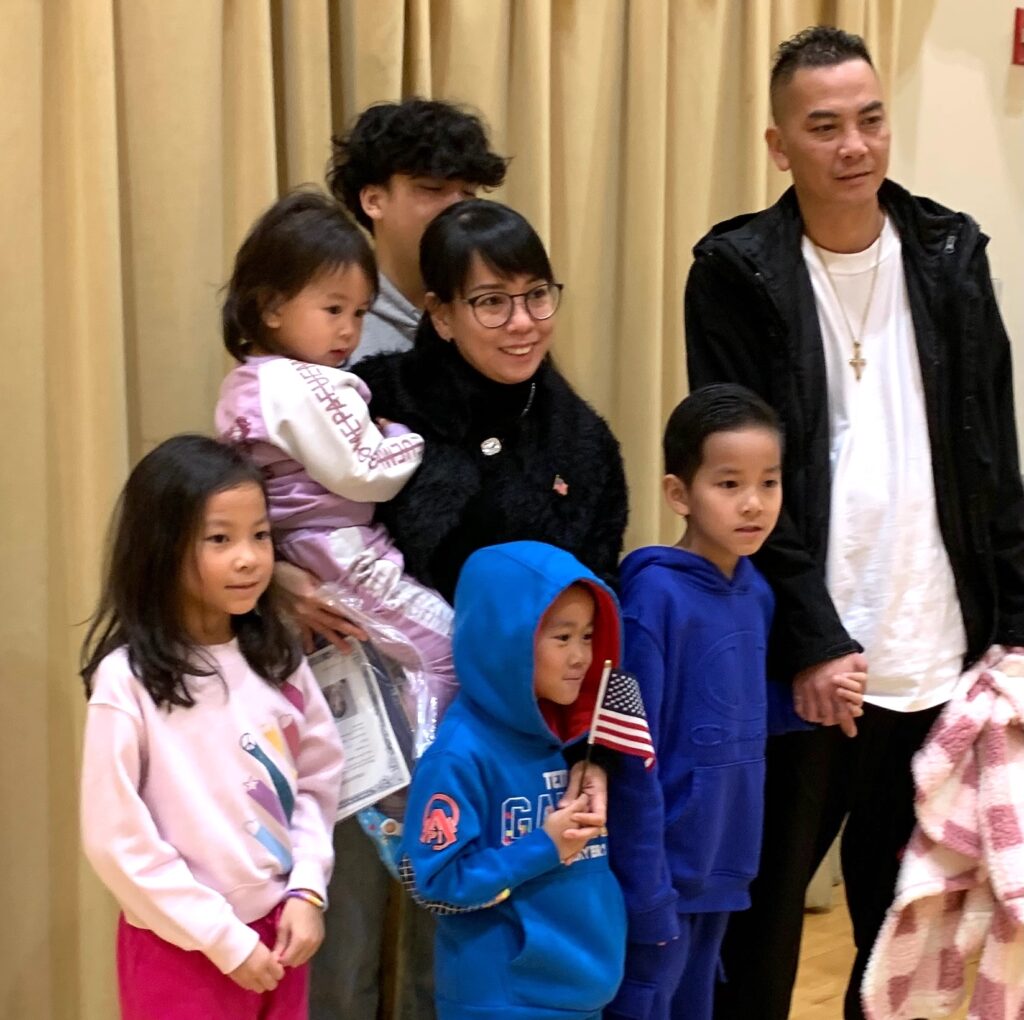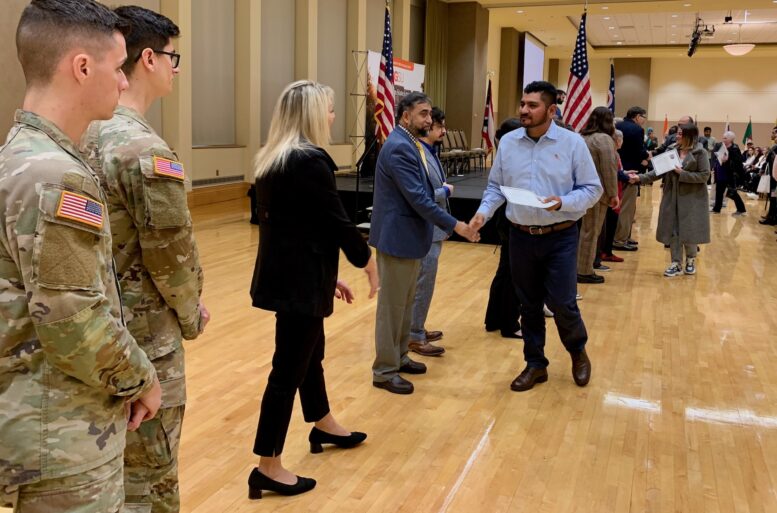By JULIE CARLE
BG Independent News
Wednesday marked a major milestone for Shabana Zahid. For her, the five-year wait to become an official U.S. citizen was over. She and her husband Huzaifa Malik and son Ateeb were among the 79 individuals who took the Oath of Allegiance to the United States during a naturalization ceremony at Bowling Green State University.
They accepted the challenge set forth by guest speaker MD Sarder to become an active citizen in her new country.
Sarder, director of BGSU’s School of Engineering, shared his story of immigrating to the U.S. He arrived from Bangladesh in 1999 to advance his education. Though he had offers to study in Canada and Japan, “I knew what I was doing; I knew the quality American universities offered,” he said.
Education was an important reason the Malik family immigrated to the U.S. in 2019. “We wanted a good education for our children,” Zahid said. Ateeb is currently a student at BGSU ready to pursue his dreams as a U.S. citizen.

“I love being a part of this great country. I plan to serve here,” she said. “We are now able to work for this country and appreciate the liberty we have in this country, where we can express our opinions freely. We also can participate in voting and have a voice.”
“This day marks the culmination of your hard work, perseverance, and commitment of becoming part of this great nation,” Sarder said. However, each person’s journey to naturalization is unique.
Some traveled from nearby countries such as Mexico and Canada and others had journeys across the globe–from countries such as Algeria, Germany, Lebanon, Russia, Sudan and Vietnam.
They came for various reasons–to leave behind oppression and war, but mostly to take advantage of the opportunities available in the United States.
The path to citizenship is not a given; it takes work. “You have to be intentional and apply for citizenship,” Sarder said. “And then this day comes and true naturalization citizenship starts.”
Citizenship is more than having a passport and being able to travel freely around the world, he said. “You have to be active in this democracy. You have to be active in the process,” he said, reminding them of President John F. Kennedy’s speech: “Ask not what your country can do for you; ask what you can do for your country.”

Across the centuries, immigrants have contributed to the diversity of the United States and made the nation “the strongest country on earth,” Sarder said. The U.S. is not the strongest because of the military, population or land size, but “we are the greatest in ideas and expressing our freedoms. This diversity makes us the strongest in all those areas.”
He gave the example of the 421 Nobel prizes awarded over the past 100 years, 71 percent of the laureates are from America and 29 percent of those are immigrants. “That tells you how we contribute in this country,” he said.
Judge Knepp added that in addition to choosing how they serve their new country, they also have additional duties as citizens to vote and serve on juries.
By registering to vote, citizens have the opportunity to serve on a jury, he said. “When you vote you are one of 200 million voters who can serve on a jury, you hold someone’s life or property in your hands. One of the most important obligations we have as citizens is to answer the call to be on a jury,” Knepp said,
Representatives from local chapters of the League of Women Voters attended to welcome the newest citizens and to give them the chance to register to vote on site.
For Knepp, the naturalization ceremony is the best part of his job.
“I spend a lot of time with people having their rights stripped away from them for crimes and losing their liberty for a period of time,” he said. I couldn’t be happier than I am right now. I’m deeply honored that you have trusted me to be the first person to welcome you here as new citizens.”
He reminded them that November is the perfect month to be grateful for their citizenship. When they sit down to Thanksgiving dinner this month, he asked them to count their blessings “to live in a country not defined by the property of people but by the things we share in common.”
“One of my jobs is to enforce the Constitution and part of doing that is protecting the rights of people who want to protest and call attention to their grievances. The hardest speech to protect is the speech you don’t agree with,” he said. “I have to protect their right to do that because that is who we are.”
He also asked that everyone take a moment to honor the men and women who serve in the U.S. military, for their service is what has provided freedoms for this country. “The way we behave as Americans is to be involved in the political process, but also to be involved as good citizens and good neighbors.”
As Knepp granted naturalization to the recipients, emotions were high and patriotism flooded the space. There were shouts of joys and tears of relief.

After the ceremony, Trinh Tyet Trinh smiled as her husband and five children from ages 2 to 15 posed for photos. She came to the U.S. from Vietnam when she married her husband, John Nguyen.
“I came here to help take care of my parents and to give a good education to my children,” she said.
“Your decision to become citizens is an act of faith in yourself in this country and it’s a promise. You have chosen to contribute your talent culture and voices to this great tapestry we call America,” Sarder said. ”Each of you will help write its next chapter with your stories, your cultures and your dreams. Welcome to this great family.”



